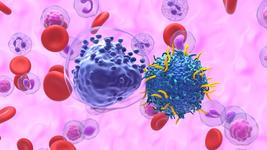CMN Weekly (3 December 2021) - Your Weekly CRISPR Medicine News
By: Karen O'Hanlon Cohrt - Dec. 3, 2021
CMN Intelligence - The World’s Most Comprehensive Intelligence Platform for CRISPR-Genomic Medicine and Gene-Editing Clinical Development
Providing market intelligence, data infrastructure, analytics, and reporting services for the global gene-editing sector. Read more...
Top Picks
- The future of CRISPR is now. A writeup from the Association of American Colleges that addresses how CRISPR is revolutionising experimental therapies for genetic diseases ranging from sickle cell disease to blindness, and asks where should society draw the line when it comes to gene editing.
- If you are interested in learning more about CRISPR off-targets, then don’t miss our next CMN webinar "Revealing and Benchmarking CRISPR Nuclease Specificity with Next-Generation Biochemistry". Date and time: 8th December at 3 pm CEST. Our guest speaker is Stephen Jones Jr, PhD, Principal Investigator, EMBL Partnership Institute at the Vilnius University, Lithuania. Admission is free to all, sign-up details here.
- French biotechnology company Eligo Bioscience announced yesterday that on Nov 19th, 2021, the U.S. Patent and Trademark Office issued a decision and a judgement acknowledging priority to the invention of precision bacterial killing using CRISPR to Rockefeller University. This invention is owned by The Rockefeller University and exclusively licensed to Eligo Bioscience. With the ruling, the office cancelled all claims of all five SNIPR Biome's U.S. patents involved in the interference.
Industry
- Barcelona-based biotech startup Integra Therapeutics secures €4.5 million in funding from Advent France Biotechnology, Invivo Capital and Takeda Ventures. The company was founded in late 2020 as a spin-off of Pompeu Fabra University (Spain), and is creating next-generation gene-writing tools − that can be used to paste DNA sequences of any size with high precision − to boost the efficiency and safety of advanced cancer therapies.
- Spotlight Therapeutics has closed a $30M Series A round led by GV (formerly Google Ventures) to advance its pipeline of non-viral in vivo CRISPR gene-editing biologics. The company’s proprietary technology platform develops programmable CRISPR ribonucleoproteins (RNPs) optimised for in vivo cell-targeted delivery, with lead programmes in haemoglobinopathies and immunooncology.
- US-based Tune Therapeutics Inc. has launched with $40 million in initial financing with plans to pursue both rare and complex disease indications with a series of CRISPR-Cas9-based epigenetic editors. Its proprietary TEMPO platform is designed to detect and modulate aberrant gene expression in a targeted way, without introducing potentially problematic DNA strand breaks or changes to the genetic code.
Clinical
- University of Californa San Fransisco (UCSF) Benioff Children’s Hospital Oakland has received $17M in grant funding to launch a 4-year clinical trial that will evaluate a new CRISPR-based cell therapy for sickle cell disease. The Phase 1/2 trial, which is led by Mark Walters, MD, a professor of paediatrics at UCSF, plans to enrol its first patient later this year, and will use CRISPR-Cas9 technology on patients’ own blood stem cells to correct the mutated gene.
Research
- In a new publication in PNAS, researchers in Korea provide a thorough description of the mechanisms governing the generation of complete double-stranded DNA breaks by the single catalytic site of Cas12a. Using single-molecule fluorescence assays, the team could develop a rational design for more potently engineered Cas12a variants including the nickase form, which would greatly expand the range of genome-editing applications of Cas12a.
- Researchers in Finland describe a highly efficient method for simultaneous base editing and reprogramming of fibroblasts employing a CRISPR-Cas9 adenine base editor. As a proof of concept, they applied their strategy to generate gene-edited human-induced pluripotent stem cells (hiPSCs) from skin biopsies of four patients carrying a Finnish-founder pathogenic point mutation in either NOTCH3 or LDLR genes, and they could show LDLR activity restoration after gene correction. The new method can yield huge numbers of hiPSC monoclonal lines with unprecedented efficiency and robustness and the findings were published in Stem Cell Reports last week.
- A team of researchers in the UK has developed a CRISPR-Cas strategy to manipulate bacterial nonribosomal peptide synthetases (NRPS) and related megasynthase enzymes, which are the key assembly line enzymes in bacteria for the production of natural compounds. The findings, which were recently published in Nature Communications, could open up for the production of a new generation of complex antibiotics.
- In a recent publication in Nature Communications, scientists in the U.S. and Greece describe a method to deliver CRISPR-Cas9 ribonucleoprotein to human and mouse adipocytes, and show that implantation of ex vivo CRISPR-edited adipocytes − in which the browning co-repressor NRIP1gene is disrupted − into high fat diet fed mice decreases adiposity and liver triglycerides while enhancing glucose tolerance. The authors argue that their findings advance a therapeutic approach to improve metabolic homeostasis through CRISPR-based genetic enhancement of human adipocytes without exposing the recipient to immunogenic Cas9 or delivery vectors.
Reviews
- Are CRISPR Screens Providing the Next Generation of Therapeutic Targets? Authors from the Broad Institute at MIT, Dana Farber Cancer Institute and Harvard Medical School address this question in a recent review in Cancer Research.
- Current and Emerging Therapies for Hereditary Transthyretin Amyloidosis: Strides Towards a Brighter Future. Authors at the Amyloidosis Research and Treatment Centre, IRCCS Fondazione Policlinico San Matteo in Italy describe the evolving therapeutic landscape for hereditary transthyretin amyloidosis and discuss how this devastating condition is turning into a treatable disease, thanks to advances in CRISPR technology. The authors also provide an overview of the molecular mechanisms involved in transthyretin (TTR) amyloid formation and regression in order to highlight how an increased understanding of the disease mechanisms has been crucial to therapeutic advances. The authors finish by discussing major areas of uncertainty and unmet needs with respect to long-term patient outcomes.
COVID-19
- A team of scientists including staff at Mammoth Biosciences and UCSF-Abbott Viral Diagnostics has shared findings describing the development and validation of a COVID-19 variant DETECTR® assay incorporating loop-mediated isothermal amplification (LAMP) followed by CRISPR-Cas12 based identification of single nucleotide polymorphism mutations in the SARS-CoV-2 spike (S) gene. The assay targets the L452R, E484K, and N501Y mutations associated with nearly all circulating viral lineages. The findings were shared on the pre-print server medRxiv earlier this week.
Awards
- Cardea Bio’s CRISPR-SNP-Chip for the detection of single -point mutations wins The Scientist’s 2021 Top 10 Innovations award. You can read more about the CRISPR chip in our interview with Cardea’s Chief Scientific Officer Kiana Aran.
Webinars and Podcasts
- Panel Discussion: CRISPR screening in practice and its potential. A free event hosted by BioTechniques, featuring expert discussions concerning CRISPR screening tools, potential challenges and best practice tips for using these methods. The panel members will also discuss their own perspectives on where they believe CRISPR screening will have the biggest impact in the future and what novel applications it could be used to explore. See details and sign up here.
Huh, Heh, Wow
The North Carolina-based food and tech company Pairwise moves closer to creating seedless berries. By applying CRISPR to alter the DNA of blackberries and black raspberries, the company aims to make the fruits more enticing to consumers and the producers who grow them.
Tags
ArticleMissing linksNewsCMN WeeklySickle Cell Disease, SCDCardea BioEligo BioscienceIntegra TherapeuticsMammoth Biosciences, Inc.Spotlight Therapeutics
CLINICAL TRIALS
IND Enabling
Phase I
Phase II
Phase III
Gastric Cancer and Colorectal Cancer, CRC, (NCT07166263)
Sponsors:
Base Therapeutics (Shanghai) Co., Ltd.
Sponsors:
Base Therapeutics (Shanghai) Co., Ltd.
IND Enabling
Phase I
Phase II
Phase III
Relapsed or Refractory Acute Myeloid Leukemia, AML, (NCT06541444)
Sponsors:
Base Therapeutics (Shanghai) Co., Ltd.
Sponsors:
Base Therapeutics (Shanghai) Co., Ltd.
IND Enabling
Phase I
Phase II
Phase III







